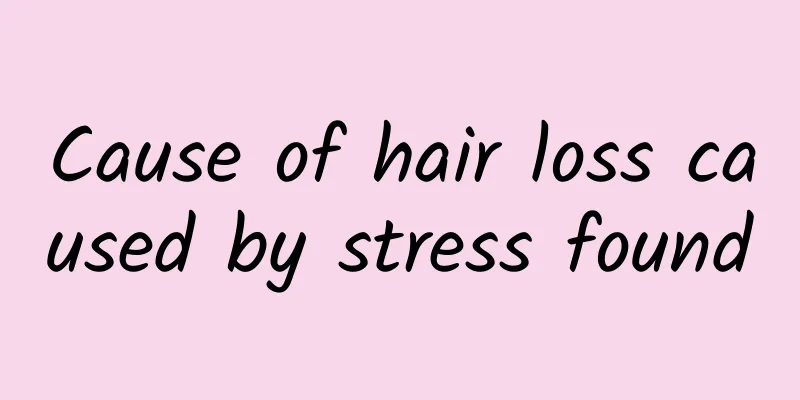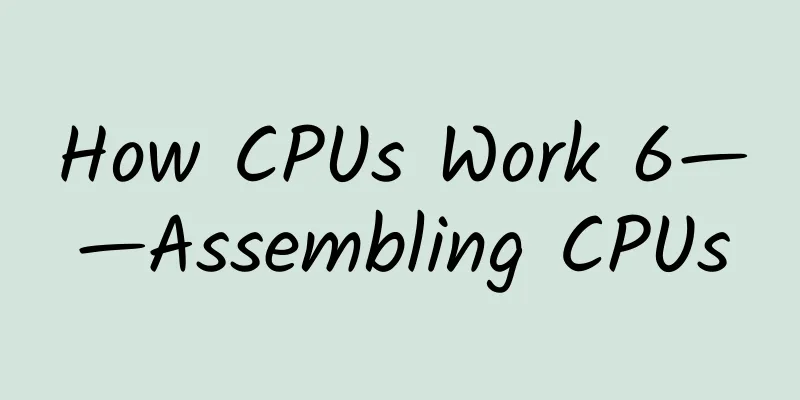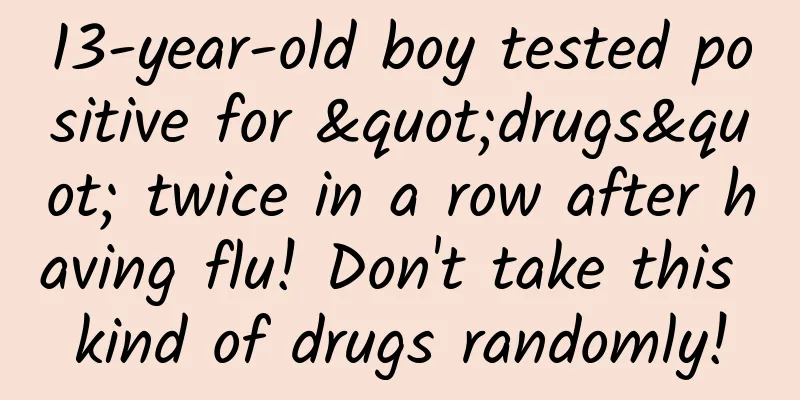Cause of hair loss caused by stress found

|
Hair loss is one of the new "incurable diseases" of young people today. It is as deeply troubling to the public as staying up late and procrastination. Working all night will cause hair loss, studying hard will also cause hair loss, and being unwell will also cause hair loss. Hair loss is simply everywhere. As a person who is deeply engaged in scientific research, I am also a high-risk group for hair loss. So I have paid attention to hair loss early on! Every time we have a meeting, I look over and secretly sigh in my heart that there are so many smart people. Although there have been many reports and organizations telling us that hair loss is often related to genetic factors, many people probably have questions about this. For example, if it is a genetic problem, why did our parents have a much lower rate of hair loss at the same age as us young people today? Genes can't change so much in a short period of time, right? In fact, you may have noticed that stress can also cause hair loss. Don’t tell me, there are even special studies on this. Today, let’s talk about the problem of hair loss caused by stress. 01. Stress can cause hair loss In fact, there have been studies on the relationship between chronic stress and hair loss, and in recent years, its mechanism has also been revealed. For example, this article published in Nature is a study on the mechanism of the relationship between stress and hair loss [1]. In this study, the researchers used a mouse model to explore the mechanism of hair regeneration. Hair regeneration essentially depends on the activity of hair follicle stem cells. Hair follicles will naturally cycle periodically between the resting phase (Telogen) and the growing phase (Anagen). When in the growing phase, the hair follicle stem cells are activated, so the hair follicles regenerate and grow hair, so that the hair grows rapidly; when in the resting phase, the hair follicle stem cells are in a dormant state, and our shed hair is difficult to be replenished in time, so hair loss occurs. So can stress affect the state of hair follicle stem cells? So they decided to study the adrenal glands, which are closely related to stress. By comparing mice with adrenalectomy and sham-operated mice, they found that both male and female mice had a shorter resting period after adrenalectomy, and their hair follicle stem cells were more active, so they were able to restore hair in a timely manner. 02. Corticosterone So, which hormone is at work? The researchers further explored and found that it is a hormone called corticosterone. The analogue of this hormone in the human body is cortisol, which is a hormone widely believed to be related to stress sensing. Under normal circumstances, chronic stress will cause the body to secrete corticosterone as a stress hormone. Further, the researchers explored whether corticosterone was related to the activity of hair follicle stem cells in mice, and the results were indeed as expected. Supplementing corticosterone can effectively inhibit the recovery of hair follicle stem cells in mice, resulting in slow hair growth in mice. It can be seen from this that corticosterone, a stress-related hormone, is an important factor affecting the activity of hair follicles. When stress increases, the body secretes corticosterone, which reduces the activity of hair follicle stem cells. As a result, hair cannot be restored in time after falling out, resulting in hair loss. 03. How to relieve hair loss? In summary, many people feel that hair loss increases when they are under great stress. This is not an imaginary belief, but a well-founded one. Stress, an exogenous factor, has a direct impact on hair loss. Urban people are under stress everywhere, which means that no matter what our genes are, long-term stress load will cause our body to respond to hormones, which will affect the activity of hair follicle stem cells and eventually cause hair loss. In addition to reconciling with yourself and relieving stress appropriately, what other ways can you relieve it? Many people choose to use traditional prescriptions and medicines to prevent hair loss. **However, everyone should be cautious. **For example, the most common method of preventing hair loss is to use ginger, which is also practiced by many people. In fact, ginger does not work as we wish. Some studies have shown that the use of ginger may not delay hair loss, but may inhibit hair growth [2]. Of course, there are also common drugs that are widely used in hair growth products, and their mechanism is mainly aimed at androgen-induced hair loss. In fact, the drug itself is not used to treat hair loss, but a vasodilator. It was once an important blood pressure lowering drug and can be used to treat severe hypertension symptoms. It is widely used in clinical practice. Later, it was found to promote hair growth, so it was also used in the treatment of hair loss. However, many people are still concerned about using drugs to treat general hair loss. After all, many people only have mild hair loss, and drugs also have certain dependence and irritation. Therefore, long-term use of drugs may encounter various adverse reactions, which makes people "daunted." What is more worrying is that the "crazy shedding period" reaction after using the drug is particularly obvious. In fact, our hair follicles have their own growth cycle, including the growth phase, regression phase and resting phase (resting phase). For people who have hair loss problems, there are more hair follicles in the regression and resting phases. The hair roots in these follicles are shallow, and the hair is like dried leaves on branches, mostly waiting to fall off. The role of anti-hair loss products is to help accelerate the shedding of resting hair and promote the regeneration of new hair. In more common terms, growing hair is a bit like a child changing teeth. The permanent teeth need to "push out" the original young teeth before they can grow out. Therefore, after using anti-hair loss products, the hair follicles that were originally in the resting phase begin a new round of growth cycle, and these "falling" hair will fall off quickly, leaving space for the hair follicles to grow healthy new hair. This hair loss phenomenon is temporary ( generally, it will not exceed one month for most people, and the effect of use varies from person to person) , so it is also called "pseudo-hair loss." We are under pressure from the times and can only move forward with this burden, but if you make good use of scientific "gadgets" to keep your hair, you can also be "extremely smart". 1. Choi, Sekyu, Bing Zhang, Sai Ma, Meryem Gonzalez-Celeiro, Daniel Stein, Xin Jin, Seung Tea Kim et al. "Corticosterone inhibits GAS6 to govern hair follicle stem-cell quiescence." Nature 592, no. 7854 (2021): 428-432. 2. Hou Chun, Miao Yong, Ji Hang, Wang Susheng, Liang Gang, Zhang Zhihua, and Hong Weijin. "Effects and mechanisms of 6-gingerol from ginger extract on hair growth." Chinese Journal of Aesthetic Medicine 25, no. 11 (2016): 58-60. |
Recommend
The disaster is over, but the nightmare continues... Huaxi doctors: If you have these symptoms, be alert to PTSD
Today we will teach you a new word: PTSD Also cal...
Why do dogs sniff each other's butts when they meet?
This article was reviewed by Zhao Xumao, a young ...
Do you know all the tricks about creative design of information flow?
The core of information flow is material. As info...
Nokia's perfect flagship Lumia 930 dismantling
Lumia 630 has already arrived in China, but there ...
What are the functions of the Lanzhou WeChat restaurant ordering mini program? How much does the WeChat food ordering app cost per year?
With the continuous development of the Internet, ...
Apple vulnerability does not affect Alibaba APP
SourceDNA, an American application analysis servi...
A method that makes fruit taste 10,000 times better! It will be too late if you don’t try it now!
As summer is about to begin, many summer fruits a...
7 major trends in marketing automation in 2022!
Globally, marketing automation has become a trend...
Does snoring mean you are sleeping well? In fact, it is the enemy of your health.
Author: Lu Xiang, Chief Physician, Shaw Hospital ...
Two ways to make money from self-media (transfer and original creation)
This article mainly introduces relevant informati...
User growth = fission? 3,000 words to explain the concept of "fission" to you!
In the past few years, I have been deeply engaged...
Geely withdraws from CHS, subsidies are stopped, will China's hybrid cars be in decline?
Recently, Guangzhou issued the latest revised &qu...
Understand the advertising process in 2 minutes, from account opening to optimization!
Search promotion is a pay-per-performance online ...
The sunset is so beautiful! But when I took the photo with my phone, it felt wrong...
Recently, breathtaking sunsets have appeared freq...
Xiaomi acquires autonomous driving company for 500 million yuan, absorbs Microsoft talents, and accelerates its pace of car manufacturing
Lei Jun, known as a "model worker", too...









